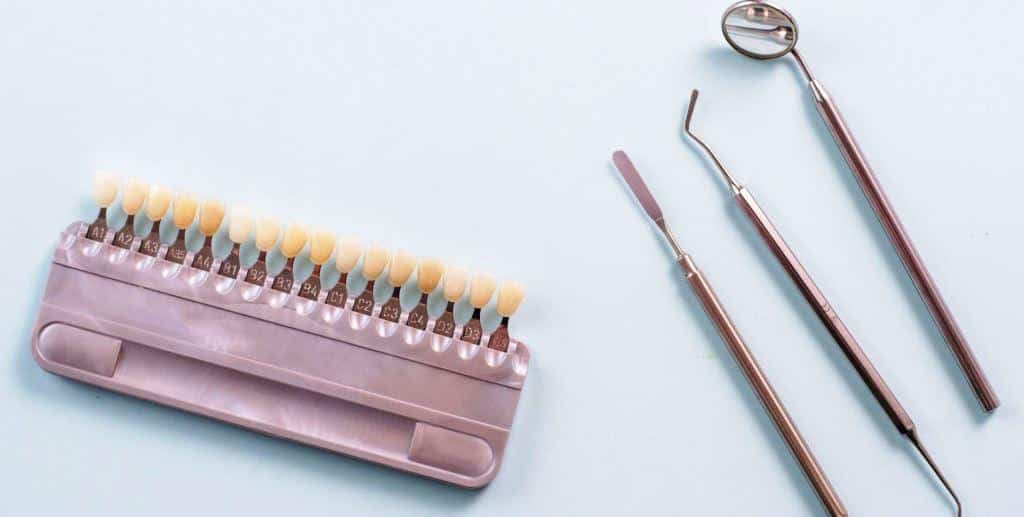They're supposedly not that visible, but still, you're reluctant to smile and if you could, you'd cover your mouth when you speak. White spots on teeth are a nightmare for many people. But what exactly are they, what are their causes and, most importantly, how to get rid of them?
What are white spots on teeth?
White spots on teeth are discolourations of the enamel covering the tooth, which can occur in both children and adults. They have different causes and are permanent in nature.
Importantly, they are not always just an aesthetic problem. Sometimes they are a sign of deeper changes in our body. So don't underestimate it and make an appointment with your dentist as soon as possible.

What do white spots on teeth mean?
The enamel covering our teeth is the hardest tissue in the body, made up of fluoride and calcium. Therefore, the first two causes of white spots on teeth are related to an imbalance of these elements.
The first is fluorosis, which is the result of excess fluoride during the formation of teeth. Fluoride is mainly absorbed from water and air, but it can also be found in tea or toothpaste. While fluoride applied to the surface of the teeth strengthens them, if taken in internally, it can become a source of discolouration.
White spots on the teeth, caused by excessive fluoride absorption, are areas that are more fragile and susceptible to bacteria, which can eventually lead to tooth decay.
Another cause of white spots is decalcification of the enamelwhich causes plaque to appear on the surface of your teeth just a few hours after brushing. Demineralisation results from calcium deficiencies in the body.
White spots on the teeth are often struggled with by those wearing braces, as it makes it difficult to brush the teeth, making the enamel even more vulnerable to acids and bacteria. You can read about how to take care of your teeth while wearing braces in our article: How to care for teeth with braces.
Another cause of white spots on teeth is hypoplasiaThis is an underdevelopment of the enamel. It is caused by a poor diet low in vitamins A D, K and C and the minerals calcium, fluoride or magnesium. Stains can also occur as a side effect of certain medications and with digestive diseases such as reflux or coeliac disease.

White spots on teeth - how to get rid of them?
If you notice white stains on your teeth, don't delay and make an appointment with your dentist to find the cause of the stains and get rid of them quickly. Although stains are permanent in nature, there are now several effective ways to remove white spots and enjoy a snow-white smile again. Below are the most popular ones.
Microbrasion - is a procedure to unify the colour of teeth by abrading a microscopic layer of enamel using special pastes and dental tools. It is usually combined with whitening for a better effect.
Teeth whitening at the dentist gives quick and satisfactory results. In our clinic we offer teeth whitening with the Enlighten system - the only system with guaranteed whitening to the Vita B1 colour. You can find more information on this subject on our website.
If whitening has not given you satisfactory resultsThen you may decide to have veneers fitted. These are thin porcelain trays that are bonded to the tooth surface. The good thing about veneers is that they allow you to not only change the colour of your teeth, but also their angle, shape and size. In addition, they protect the teeth from further damage.
If you're thinking about veneers, read our article on them Dental veneers in the UK. Everything you need to know. And if you have any questions, make an appointment to visit.
We would like to remind you that in our office, dental treatment, but also teeth whitening or the application of veneerk you can spread out in instalments. How does this work? You can find out in this article Teeth on credit: dental treatment on hire purchase. Importantly, our instalment system is 100% secure and regulated by the Financial Conduct Authority (FCA number 619628).

How to remove their cause?
You will not always be able to completely get rid of the source of white spots on your teeth. This is because sometimes they are due to diseases of the digestive system, but it is always worth minimising the risk of their appearance.
In the case of enamel demineralisationIf you are suffering from calcium deficiency or hypoplasia, you should enrich your diet with calcium-rich foods such as milk or cheese to increase the presence of this element in your body. You can also use enamel fluoridation products or make an appointment for fluoridation at the dental surgery.
An interesting way to protect enamel from further erosion is resin infiltration. It involves applying a special resin preparation to the teeth, which penetrates the enamel. It is a completely painless and non-invasive method.
And most importantly, visit the dental office regularly. Your dentist is able to spot any changes in your mouth at an early stage and start treatment straight away. If you are struggling with white spots on your teeth or the last time you were in the dentist's office was 6 months ago or longer, it is essential to make an appointment.

